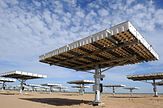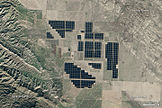Solar PV power system
|
||||
| Photovoltaic power systems and components: Top: solar string inverter and other BOS components · Solar array on rooftop in Hong Kong, China · BIPV on balcony in Helsinki, Finland |
Top: solar string inverter and other BOS components · Solar array on rooftop in Hong Kong, China · BIPV on balcony in Helsinki, Finland
Middle: rooftop system in Boston, United States · Westmill solar park in the United Kingdom · Dual axis tracker with CPV modules · Topaz, one of the world’s largest solar power station, as seen from space
Bottom: commercial rooftop PV system of about 400 kWp · Power plant on Mt. Komekura, Japan · Solar PV system on Germany's highest mountain-top
A photovoltaic system, also PV system or solar power system, is a power system designed to supply usable solar power by means of photovoltaics. It consists of an arrangement of several components, including solar panels to absorb and convert sunlight into electricity, a solar inverter to change the electric current from DC to AC, as well as mounting, cabling and other electrical accessories to set up a working system. It may also use a solar tracking system to improve the system's overall performance and include an integrated battery solution, as prices for storage devices are expected to decline. Strictly speaking, a solar array only encompasses the ensemble of solar panels, the visible part of the PV system, and does not include all the other hardware, often summarized as balance of system (BOS). Moreover, PV systems convert light directly into electricity and shouldn't be confused with other technologies, such as concentrated solar power or solar thermal, used for heating and cooling.
...
Wikipedia










